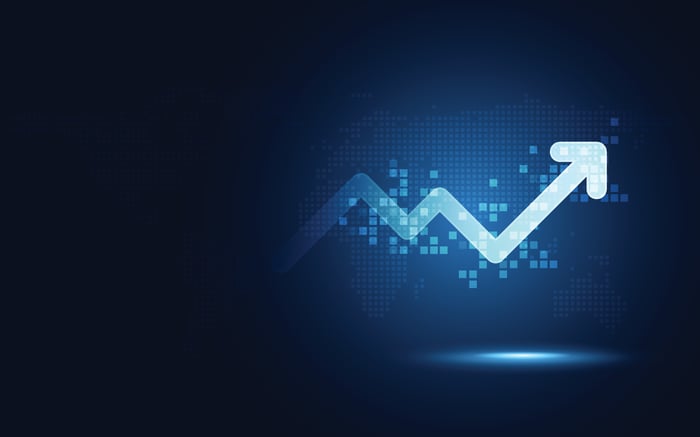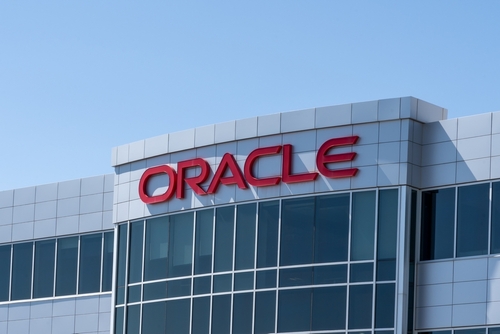Apple's New Products May Help the Stock, but Services Matter Most Heading Into Fiscal 2026

Key Points
Apple's latest iPhones and wearables refresh the lineup, but the higher-margin services business is doing the real heavy lifting.
Services now account for close to one-third of the tech giant's revenue, with materially higher margins than hardware.
The stock's premium valuation means the investment case hinges more on services compounding than on any single product cycle.
Apple (NASDAQ: AAPL) shares have been choppy around this week's product event as investors parse what the iPhone 17 family, a new ultra-thin iPhone Air, and updated wearables mean for demand this holiday season. The Cupertino, California-based tech company refreshed its flagship devices with faster chips, display and camera upgrades, and new AirPods and Apple Watch devices.
While keeping its lineup fresh is vital, the more important driver for the company (and the stock) going into fiscal 2026 is Apple's services business, home to the company's App Store, subscriptions, payments, advertising, iCloud, and more. It is growing faster than hardware, carries far higher margins, and is steadily representing a bigger slice of Apple's profit. Yes, product cycles may sway the stock day to day, but the steady drumbeat of services growth is what can sustain earnings growth and support the stock's premium valuation over time.
Where to invest $1,000 right now? Our analyst team just revealed what they believe are the 10 best stocks to buy right now. Continue »

Image source: Getty Images.
Recent results highlight Apple's crown jewel
Apple closed fiscal Q3 (the quarter ended June 28) with $94.0 billion in revenue, up 10% year over year, and earnings per share of $1.57, up 12%. Management highlighted a record for total revenue in the quarter ending in June, as well as an all-time high for services revenue.
"Today Apple is proud to report a June quarter revenue record with double-digit growth in iPhone, Mac and Services," CEO Tim Cook said in the earnings release, adding that Apple Intelligence features continue to roll out across its platforms. The company also noted its installed base reached a new all-time high across every product category.
But services did the heavy lifting. The important segment's revenue rose to $27.42 billion, up about 13% year over year, and represented roughly 29% of total sales for the period. More importantly for investors, Apple's services carry structurally higher profitability. To this end, Apple's services gross margin was about 76% in the quarter, versus roughly 35% for products. That spread explains why steady services growth can move overall earnings even when device cycles ebb and flow.
Over the longer haul, services have clearly become a bigger piece of the pie. For the nine months ended June 28, 2025, services made up roughly a quarter of Apple's total revenue -- up significantly from fiscal 2019, when the segment accounted for less than 18% of sales.
This rising contribution highlights how much more important recurring, high-margin services have become to the overall business. This trend should persist over the long haul. Sure, the mix will not move up in a straight line (blockbuster product launches can periodically push product revenue growth ahead of services), but the overall trend of services gradually taking a larger share of the company's sales should persist.
Investors are also watching closely to see whether Apple's investments in artificial intelligence (AI) can become a catalyst for faster services growth. Features like Apple Intelligence and on-device AI enhancements, as well as tighter integration across iCloud, subscriptions, and the App Store, could deepen engagement and create new revenue streams.
Apple has already signaled this push. Management said in its July earnings call that the company is significantly growing its investments in artificial intelligence. In addition, management said it's making good progress on the development of a more personalized Siri, which is expected in 2026, underscoring how central AI is becoming to Apple's long-term strategy.
If successful, these initiatives may not only sustain services expansion but even accelerate its growth rate over time.
New products are helpful
This week's event was certainly important for the stock. Such a robust suite of new products should help drive upgrades. Apple introduced the iPhone 17 Pro, starting at $1,099 -- featuring the A19 Pro chip, design changes, and camera improvements -- alongside the iPhone 17 lineup and the thin iPhone 17 Air. Additionally, AirPods Pro gained live translation and health-sensing features, and Apple updated its Watch models ahead of the holidays. These are meaningful refinements that keep the ecosystem fresh and even have the potential to nudge average selling prices higher.
Ultimately, though, fiscal 2026's story is likely to be written in services. The recurring, subscription-heavy nature of this segment, combined with Apple's record installed base, creates a durable runway for growth. With services already accounting for close to a third of revenue and the majority of gross profit, incremental gains here can offset variability in hardware cycles and support continued earnings expansion.
That is especially relevant given where the stock trades today. At a price-to-earnings multiple in the 30s, investors are paying for steady, high-margin earnings compounding -- powered more by services than by any single iPhone feature.
A key risk for the stock, of course, is tariff uncertainty. Additionally, competition in streaming, cloud storage, and advertising is intense. And if hardware demand underwhelms for multiple cycles, the knock-on effects to services growth could slow. But Apple's financial position remains strong, with ample cash generation to invest in new services, support the ecosystem, and continue sizable buybacks and dividends. These dynamics -- rising services revenue and significantly higher services margins -- are the parts of the Apple story that matter most as investors look toward fiscal 2026.
Should you invest $1,000 in Apple right now?
Before you buy stock in Apple, consider this:
The Motley Fool Stock Advisor analyst team just identified what they believe are the 10 best stocks for investors to buy now… and Apple wasn’t one of them. The 10 stocks that made the cut could produce monster returns in the coming years.
Consider when Netflix made this list on December 17, 2004... if you invested $1,000 at the time of our recommendation, you’d have $640,916!* Or when Nvidia made this list on April 15, 2005... if you invested $1,000 at the time of our recommendation, you’d have $1,090,012!*
Now, it’s worth noting Stock Advisor’s total average return is 1,052% — a market-crushing outperformance compared to 188% for the S&P 500. Don’t miss out on the latest top 10 list, available when you join Stock Advisor.
*Stock Advisor returns as of September 8, 2025
Daniel Sparks and his clients have positions in Apple. The Motley Fool has positions in and recommends Apple. The Motley Fool has a disclosure policy.





